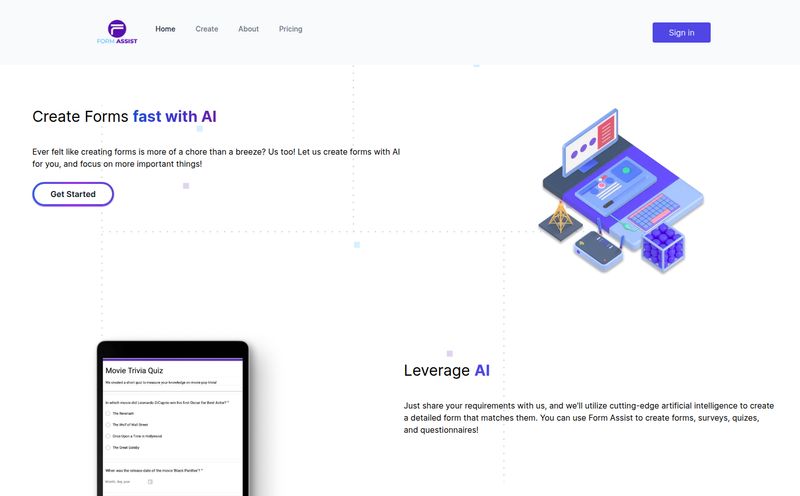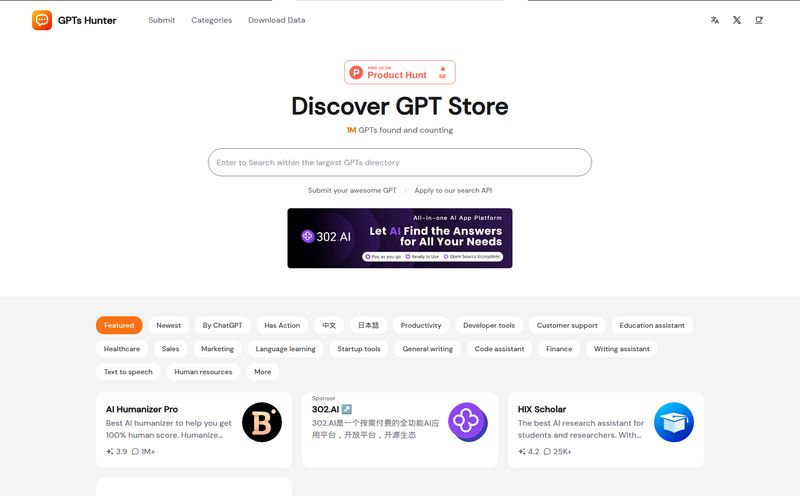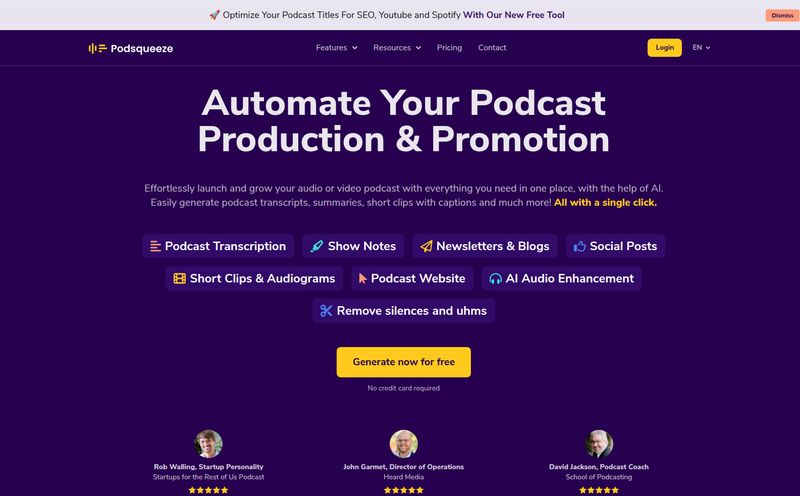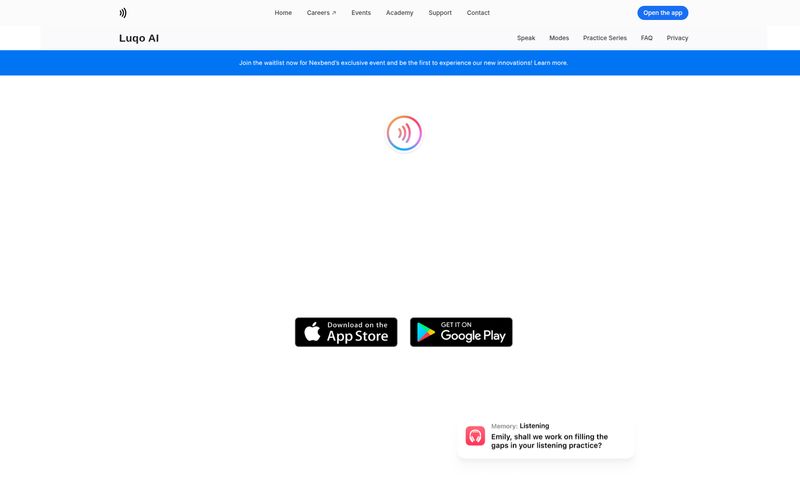Alright, let’s have a little chat. If you’ve ever been tasked with finding European public funding, you know the feeling. It starts with optimism. A fresh cup of coffee, the EU Funding & Tenders Portal open in a tab, a sense of purpose. An hour later, you’re 17 PDFs deep, drowning in bureaucratic jargon, and questioning all your life choices. It’s a rite of passage, I suppose. A digital pilgrimage through a labyrinth that feels intentionally designed to break your spirit.
I've been there. I've helped startups and non-profits navigate that maze, and frankly, it often feels like you need to hire a full-time 'grant whisperer' just to make sense of it all. The cost, in both time and sanity, is steep.
So when a tool called GrantGPT landed on my radar, my professional curiosity was piqued. The name itself is bold, hitching its wagon to the biggest star in the AI sky. But the promise? To be a “public funding matchmaker.” To turn weeks of research into minutes. My inner skeptic raised an eyebrow, but the part of me that remembers those late nights squinting at dense legal documents leaned in closer. Could this actually work?
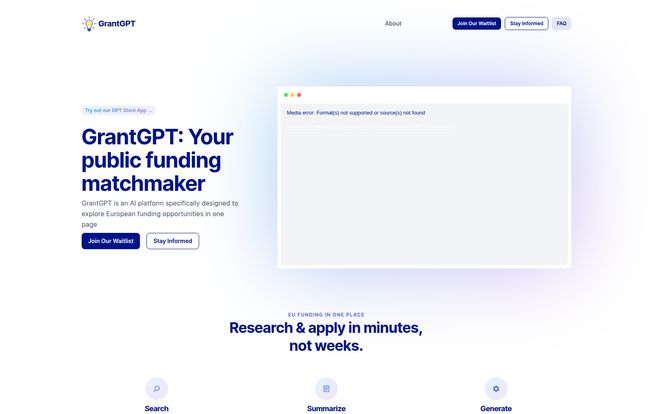
Visit GrantGPT
So, What is GrantGPT in Plain English?
Let's cut through the marketing speak. GrantGPT is an AI-powered platform built specifically to streamline the hunt for European funding. Think of it less as a simple search engine and more like a smart research assistant. It connects to the official database of EU calls for proposals, but instead of just dumping thousands of results on you, it uses AI to help you find the right ones, understand them quickly, and even get a head start on the paperwork. It’s a German-built tool, which, for anyone working in the EU space, immediately brings a certain sense of reliability to mind, especially concerning data privacy.
The All-Too-Familiar Nightmare of Grant Hunting
Before we get into what GrantGPT does, let's commiserate for a moment on the problem it’s trying to solve. Finding the right grant is a job in itself. You're constantly cross-referencing documents, trying to decipher eligibility criteria that seem written in another language, and keeping track of deadlines that are scattered across different programs. Is this call part of Horizon Europe? Is it a regional fund? Do I qualify? By the time you find a potential match, you’re already exhausted.
And then comes the application. The endless emails, the report drafting, the summaries needed for stakeholders. It’s a mountain of administrative work that drains resources away from the actual project you’re trying to fund! It's a classic case of the process getting in the way of progress. I’ve seen promising projects stall simply because the team lacked the sheer manpower to tackle the grant application process.
How GrantGPT Aims to Change the Game
This is where GrantGPT steps onto the stage. It’s not about replacing human oversight, but about augmenting it. It’s a power tool for a job you were previously doing with a screwdriver. Here’s how it breaks down.
AI-Powered Search That Actually Understands You
Instead of just matching keywords, GrantGPT’s search is designed to be more intuitive. But the real magic isn’t just finding the calls; it’s keeping them fresh. The platform says it updates daily, pulling directly from the source. This is huge. There’s nothing worse than spending a day researching a call for proposals only to find out it closed last week. Having a single, reliable, up-to-date dashboard is a massive first step.
From Walls of Text to Quick, Digestible Summaries
This, for me, is the hero feature. You find a 150-page document for a call that looks promising. Are you going to read it all? Be honest. GrantGPT uses its AI to browse those thousands of pages for you and pull out the key information. What’s the budget? Who is eligible? What are the core objectives? It condenses that mountain of text into a molehill of actionable insights. This feature alone could reclaim countless hours of your life. Seriously.
Automating the Tedious Stuff: Document Generation
Once you’ve found your perfect match, the work is just beginning. GrantGPT steps in here too, helping to automatically draft documents, emails for potential partners, and internal reports. It gives you a starting point—a template infused with the specifics of the call you’re targeting. It’s not going to write a winning proposal for you from scratch (and it shouldn't!), but it handles the grunt work, freeing up your brainpower for the important stuff: strategy, innovation, and crafting a compelling story.
Trust, Transparency, and Those German Privacy Standards
Let's talk about the elephant in the room with any AI tool: trust. GrantGPT seems to take this seriously. Being Berlin-based, they highlight their GDPR compliance and note that they're in the process for ISO 27001 certification. That's not just fluff; it's a critical commitment for anyone handling potentially sensitive project information.
Even better, they provide citations for all their AI-generated results. This is a game-changer. It means you’re not just taking the AI’s word for it. You can see exactly where it got the information from in the original funding documents. This builds a bridge of trust between the user and the technology, which is something a lot of AI tools miss. The fact that its development is co-financed by the European Union and supported by Berlin-based incubators also adds a thick layer of credibility.
A Realistic Look at GrantGPT
No tool is perfect, right? It’s important to have a balanced view. From my analysis, the advantages are pretty clear. You get a comprehensive and constantly updated dataset of EU funding opportunities, saving you an incredible amount of time with its AI-powered search and summarization. The document drafting automation is the cherry on top, tackling one of the most draining parts of the process. The clear citations are a massive win for credibility.
On the other hand, there are a few things to keep in mind. The platform’s strength is its direct line to the EU Funding & Tenders Portal, but this also means its scope is defined by that single source. For most, this is all they need, but it's worth noting. And like any AI, the results are only as good as the underlying models and data—there's always a chance of a weird summary or a missed nuance, which is why those citations are so important for double-checking. Finally, while there might be a free tier, the really powerful features will almost certainly be part of a paid premium service. That’s just the reality of SaaS today.
So, What's the Price Tag?
As of right now, GrantGPT is operating on a waitlist model. There isn't a public pricing page, which is common for new platforms rolling out their services. Based on the information available, it seems likely they'll adopt a freemium or tiered pricing structure. This would allow users to try out the basic search functionality, with the more advanced AI summarization and document generation features reserved for paying customers. It's a fair model, allowing you to see if it works for your workflow before you commit.
Frequently Asked Questions about GrantGPT
- 1. What exactly does GrantGPT do?
- It's an AI platform that helps you find relevant European funding opportunities, summarizes the lengthy call documents into key points, and helps you draft initial documents like emails and reports, saving you time and effort.
- 2. Is GrantGPT free to use?
- While there isn't a public pricing plan yet, the model suggests some features might be free, with more advanced capabilities available under a paid premium plan. You can currently join a waitlist to get access.
- 3. Who is this tool for?
- It's designed for anyone who applies for EU funding. This includes researchers, universities, startups, established companies, and non-governmental organizations (NGOs) across Europe.
- 4. How reliable is the information?
- The platform pulls data directly from the official EU Funding & Tenders Portal and updates daily. A key feature is that it provides citations for all its results, so you can easily verify the information against the source document.
- 5. Is it just another ChatGPT wrapper?
- No. While it leverages Large Language Models (LLMs), it's a specialized tool built on a specific, up-to-date dataset of public funding calls. The value is in its focused application, data integration, and features tailored for the grant-writing process.
Is GrantGPT Worth Your Time?
Look, the world of public funding is never going to be simple. There will always be complexity. But that doesn’t mean we have to keep doing things the hard way. From what I’ve seen, GrantGPT isn't just another shiny AI toy; it’s a purpose-built tool designed to solve a very real, very frustrating problem.
By automating the most monotonous parts of the research process, it allows innovators, researchers, and changemakers to focus on what they do best: developing great projects. It’s a move toward democratizing access to funding, leveling the playing field a bit for smaller teams that can’t afford a dedicated grant writer. And for that reason alone, I’m genuinely excited to see where it goes. It might just be the funding matchmaker we've all been waiting for.
